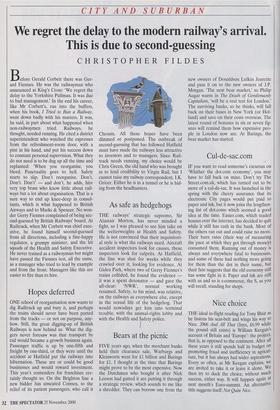CITY AND SUBURBAN
We regret the delay to the modern railway's arrival.
This is due to second-guessing
CHRISTOPHER FILDES
Before Gerald Corbett there was Ger- ard Fiennes. He was the railwayman who announced at King's Cross: 'We regret the delay to the Yorkshire Pullman. It was due to bad management.' In the end his career, like Mr Corbett's, ran into the buffers, when his book, I Tried to Run a Railway, went down badly with his masters. It was, he said, in part about what happened when non-railwaymen tried. Railways, he thought, needed running. He cited a district superintendent who watched the expresses from the refreshment-room door, with a pint in his hand, and put his success down to constant personal supervision. What they do not need is to be dug up all the time and replanted: 'When you reorganise, you bleed. Punctuality goes to hell. Safety starts to slip. Don't reorganise. Don't. Don't. Don't' — and don't, he adds, hire very top brass who know little about rail- ways but a lot about organisation. That is a sure way to end up knee-deep in consul- tants, which is what happened to British Airways and to Marks & Spencer. No won- der Gerry Fiennes complained of being sec- ond-guessed by British Railways' board. At Railtrack, when Mr Corbett was chief exec- utive, he found himself second-guessed from all directions, including a fine-happy regulator, a grumpy minister, and the hit squads of the Health and Safety Executive. He never trained as a railwayman but might have passed the Fiennes test, all the same, as a manager who tried to lead by example and from the front. Managers like this are easier to fire than to hire.





























































































 Previous page
Previous page